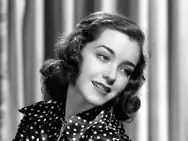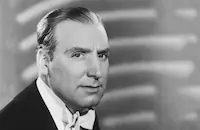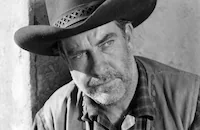Panama Hattie

Brief Synopsis
Cast & Crew
Norman Z. Mcleod
Red Skelton
Ann Sothern
"rags" Ragland
Ben Blue
Marsha Hunt
Film Details
Technical Specs

Synopsis
In Panama's Canal Zone, during World War II, sailors Red, Rags and Rowdy go to Phil's Palace to see the musical revue starring their friend Hattie Maloney, also known as Panama Hattie. After her number, Hattie tells the men that she is going to marry soldier Dick Bulliet, who comes from a prominent family in Philadelphia, but first she must meet his eight-year-old child from a previous marriage. The next day, Dick goes to the dock to greet his daughter Geraldine, who is accompanied by the family's starchy English butler, Jay Jerkins. Also disembarking is the elegant Leila Tree, the admiral's niece, who greets Dick as an old friend. Hattie and her friend, Flo Foster, the cigarette girl at the club, meet Dick and Geraldine in the town square, and Hattie is offended and hurt when Geraldine laughs at her gaudy outfit and slang expressions. Hattie spends the evening drinking at Phil's. The following morning, a hung over Hattie is having breakfast with her sailor friends when Flo asks to accompany her to Dick's rented cottage because she has fallen in love with Jerkins. Dick comes for Hattie and introduces her to Leila, whose snobbish manner irritates her. At Dick's cottage, Hattie and Geraldine cement their friendship as Flo flirts with Jerkins. Later, Leila's friend, Lucas Kefler, gives a note to Hans, a waiter at the club, instructing him to go to the "empty house" at midnight and "do your stuff." Hans gives the assignment to his co-worker Bruno. Meanwhile, Red tells Rags they must help Hattie, and gives Bruno a note for Leila. Bruno accidentally gives Leila the wrong note, and when she indignantly confronts Red, he suggests that she could improve her image by dating a sailor. Leila goes to Hattie's dressing room and accuses her of putting Red up to insulting her, then announces herself as a rival for Dick's affections. She tells Hattie that she will never belong to Dick's world, and after Leila leaves, Hattie weeps in despair. Red, meanwhile, looks at the note Leila left behind, and when he sees it is not the one he sent her, he realizes something suspicious is going on. Red, Rags and Rowdy show the note to Hattie, who is packing to leave Panama, and tell her it must be the work of spies. That night, the sailors nervously enter the empty house, which is rumored to be haunted, and have just discovered a chemistry set when two men arrive. One of the men disappears through a secret passageway, and the other escapes and shoots at the sailors from outside the house. Red, Rags and Rowdy manage to get out moments before a bullet ignites the chemicals and the house explodes. The next day, Hattie is saying goodbye to the bartender at Phil's when Kefler insults her by calling her "terrific," and the sailors attack him. Hans and Bruno join in, and a huge brawl erupts. Jerkins, who witnessed the start of the brawl, goes to Dick's cottage and announces that Hattie has boarded a boat to New York, and Dick and Geraldine rush off to stop her. Meanwhile, Red, Rags and Rowdy are nursing their bruises in the stockade when the guard tells them that the men they were fighting with are spies. The sailors are given a hero's parade through the streets of Panama, winding up at the club. Dick, Geraldine and Hattie arrive, and when Dick tells Leila that he and Hattie were married an hour before, she faints. Red revives Leila and proposes to her, promising to take her around the world and show her "where Japan used to be."

Director

Norman Z. Mcleod
Cast

Red Skelton

Ann Sothern

"rags" Ragland

Ben Blue

Marsha Hunt

Virginia O'brien

Alan Mowbray

Dan Dailey Jr.
Jackie Horner

Carl Esmond

Pierre Watkin
Stanley Andrews

Lena Horne
James Berry
Warren Berry
Nyas Berry
George Watts
Lucien Prival

Joe Yule
Duke York
Fred Graham

Roger Moore
Max Wagner

Grant Withers
Christine Stafford
Judy Matson
Dorothy Wilkerson
Six Hits And A Miss
Five Music Maids
Zedra De La Conde
Suzanne Ridgeway
Carmen Morales
Carmen Amaya
Leo Watson
Crew
Leo Arnaud
George Bassman
Danny Dare
Roy Del Ruth
John S. Detlie
Walter Donaldson
Roger Edens
Roger Edens
George Folsey
Arthur Freed
Cedric Gibbons
Sydney Guilaroff
E. Y. Harburg
Frank E. Hull
Hugh Hunt
Kalloch
Burton Lane
Jeni Legon
Jeni Legon
Alfred Ligou
Wilkie Mahoney
Jack Mcgowan
Vincente Minnelli
Phil Moore
Cole Porter
Merrill Pye
Conrad Salinger
Blanche Sewell
Douglas Shearer
Bert Spurlin
Georgie Stoll
Sidney Wagner
Edwin B. Willis

Photo Collections
Videos
Movie Clip



Trailer
Film Details
Technical Specs

Articles
Panama Hattie
Panama Hattie had been a big hit on Broadway for songwriter Cole Porter and music theatre legend Ethel Merman. In addition, it had made Betty Hutton a star with a showy supporting role and helped bring her understudy, chorus girl June Allyson, to Hollywood. Freed got MGM to shell out $130,000 for the film rights, but with Merman considered too big a presence for the screen, Hutton on the way to film stardom at Paramount and a troupe of musically inclined leading ladies already under contract, the only member of the Broadway ca For Merman's role, Freed cast Ann Sothern, a triple threat whose failure to make it into Hollywood's top ranks has long mystified her fans. She had been brought to MGM after Jean Harlow's death to take over the role of Maisie Ravier, traveling showgirl, in a series of low-budget comedies often better received than the studio's more prestigious films. And with her musical talents, she was a natural for the studio's big musical productions, though she never seemed to get into the right ones.
Panama Hattie was a mess from the beginning. George Murphy and Shirley Temple were originally cast as the socialite who wins Sothern's heart and his kid sister, then abruptly replaced by Dan Dailey (before he became a star at 20th Century-Fox) and Jackie Horner. Most of the score was scrapped, with Sothern only getting to sing "What Say Let's Be Buddies" and "Make It Another Old Fashioned Please." She learned a new song, "(Did I Get Stinkin') At the Savoy," only to see it handed to co-star Virginia O'Brien. Most of the love story was cut (Dailey didn't even get to sing or dance) to make room for raucous comedy featuring Rags Ragland, Red Skelton and Ben Blue. And director Norman Z. McLeod not only couldn¿t get along with Sothern, but also kept the whole thing moving at a snail's pace. It was hardly a surprise when the $800,000 film's preview was a disaster.
What would have been defeat at any other studio, however, was just the signal to get back to work at MGM. Freed got studio head Louis B. Mayer to give him another $300,000 to fix the film. Then, while discussing changes with Sothern on the set of her next film, Maisie Gets Her Man (1942), he was struck by how well director Roy Del Ruth was handling the picture. So, he assigned him to shoot re-takes. He also decided to add some new musical numbers, with his protégé, Broadway wunderkind Vincente Minnelli, directing them. And to add icing to the cake, he fit in two numbers for recently signed singer Lena Horne.
Horne had scored a hit singing at the Cotton Club, then had crossed the color barrier to topline at Café Society in New York. Despite her talent, however, studio executives were concerned that films featuring a black woman as anything other than a domestic would be banned in the South and rejected by film audiences elsewhere. With Panama Hattie, her first film at MGM, Freed would establish the way she would appear in most of the studio's films. Rather than play a role, she was billed as herself, only appearing for a few musical numbers that could easily be cut out of the film before showings in the south. The studio even developed a special makeup ("Light Egyptian," which is still in use today) to lighten her skin so as not to make her presence too shocking to racist audience members. But at the same time, they broke boundaries by clearly presenting her as a very sexy, young black woman, an image rarely seen outside of all-black independent features.
Freed juiced up the score with two more Porter songs. Sothern got to sing "I've Still Got My Health" from the original score. One of Horne's specialties was "Just One of Those Things" from Jubilee, a musical MGM had bought but never filmed. Then the Japanese attack on Pearl Harbor prompted a new grand finale. With patriotic fervor in the air, songwriters Burton Lane and E.Y. "Yip" Harburg wrote "The Son of a Gun Who Picks on Uncle Sam," which Minnelli used as an excuse to bring out the entire cast.
The new, improved Panama Hattie opened 11 months after its first preview. Critics weren't all that impressed, with the New York scribes quick to complain about changes in the original show, but audiences loved it, bringing MGM a $3 million profit. Purists would have to wait for a 1954 television special, starring Merman and Art Carney, to find a version closer to the Broadway production.
Producer: Arthur Freed
Director: Norman Z. McLeod
Screenplay: Jack McGowan, Wilkie Mahoney
Based on the musical by Herbert Fields, B.G. DeSylva and Cole Porter
Cinematography: George J. Folsey
Art Direction: Cedric Gibbons
Music: George E. Stoll
Principal Cast: Ann Sothern (Hattie Maloney), Dan Dailey (Dick Bulliet), Red Skelton (Red), Marsha Hunt (Leila Tree), Virginia O'Brien (Flo Foster), Rags Ragland (Rags), Alan Mowbray (Jay Jerkins), Ben Blue (Rowdy), Lena Horne (Herself), Joe Yule (Waiter).
BW-80m.
by Frank Miller

Panama Hattie
Quotes
Trivia
Notes
Cole Porter composed the score of the Broadway musical Panama Hattie for star Ethel Merman, marking their fourth collaboration. The show was a great success, and became the first book musical since the 1920s to run over 500 performances. Only two of Porter's songs from the stage musical-"I've Still Got My Health" and "Let's Be Buddies"-were used in the film, along with "Just One of Those Things," a song Porter wrote for the 1935 Broadway musical Jubilee. Among the original numbers from Panama Hattie omitted from the film, the most famous was "Make It Another Old-Fashioned, Please." Comedian Rags Ragland was the only member of the Broadway cast to repeat his role in the film.
The following written prologue appears in the onscreen credits: "WARNING! Any resemblance between the three sailors in this story and human beings is purely accidental." According to a 1972 Variety obituary, nightclub owner Mary Lee Kelly, an American who moved to Panama just before World War I, was said to have been the inspiration for Panama Hattie, although a modern source claims the musical was inspired by Porter's song "Katie Went to Haiti," from the 1939 Broadway musical Du Barry Was a Lady.
Hollywood Reporter news items provide the following information: RKO bid against M-G-M for the film rights, intending to give Ginger Rogers the starring role. George Murphy was originally cast in the role of "Dick Bulliet," and Shirley Temple was to have played the part of "Geraldine" before she left M-G-M to go under contract to David O. Selznick. M-G-M sought Arthur Treacher to repeat his stage role as stuffy butler "Jay Jerkins." South American singer Estrellita was considered for a specialty number, but her appearance in the final film has not been confirmed.
News items add Lester Dorr to the cast, but his appearance in the final film has not been confirmed. During the film's extensive retakes, Hollywood Reporter news items reported that Robert Young, and later William Lundigan, would replace Dan Daily, Jr. as Dick. A April 7, 1942 Hollywood Reporter news item stated that footage featuring Jackie Horner as Geraldine would be eliminated and reshot with Joan Carroll, who had played the little girl on Broadway. According to a May 1, 1942 item in Hollywood Reporter, radio star Kate Smith turned down $100,000 to perform in a musical sequence. An May 18, 1942 column in Hollywood Reporter reported that an unreleased Judy Garland recording of "Son of a Gun Who Picks on Uncle Sam" was making the rounds in Washington, D.C., adding that the song "looks like it might be the 'Over There' of this war." The column went on to suggest that M-G-M add a few new lyrics and make the song available to the government.
According to information in the file on the film in the MPAA/PCA Collection at the AMPAS Library, the Hays Office was concerned that "our Latin American neighbors" might find the film offensive. In a July 3, 1941 letter to Louis B. Mayer, Addison Durland requested that the mosquito netting in a bungalow set be omitted, fearing that the sight of it might undermine the Panamanian government's efforts to promote its country as a "healthy" tourist destination, and stressed that the dancers, spies and laborers depicted in the film not be characterized as Latin American. Despite these changes, Panama Hattie encountered numerous problems with foreign distribution. The Office of Censorship deemed the film unsuitable for Latin American audiences because of the comic portrayal of the three American sailors, and the OWI classified the film as "The Enemy" because of its espionage subplot. A September 9, 1942 Hollywood Reporter column criticized Hollywood's poor sense of public relations on the international front, adding that "too many stories about spies, fifth columnists and saboteurs have been made, in the OWI's opinion, so that the American public and fans in foreign lands possibly think our nation is riddled with subversive activity." PCA files add that the local censor board in Argentina deleted "Son of a Gun Who Picks on Uncle Sam" because of its pro-Allied sentiments, and Sweden cut the song because of derogatory references to the Japanese.
Panama Hattie marked Lena Horne's first film for M-G-M, following her debut in the 1938 film The Duke Is Tops (see AFI Catalog of Feature Films, 1931-40; F3.1147). Horne was the first African-American star to sign a long-term contract with a major studio, although her performances were generally limited to musical numbers that could be cut from the film before its distribution in Southern markets. On November 10, 1954, the CBS television network broadcast a one-hour version of Panama Hattie starring Ethel Merman.















